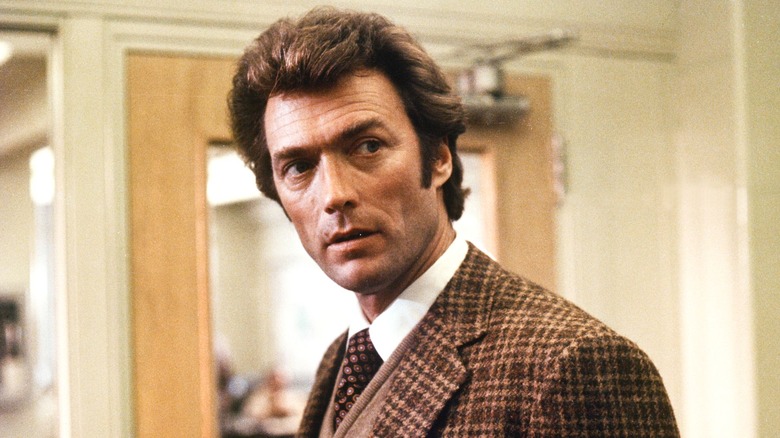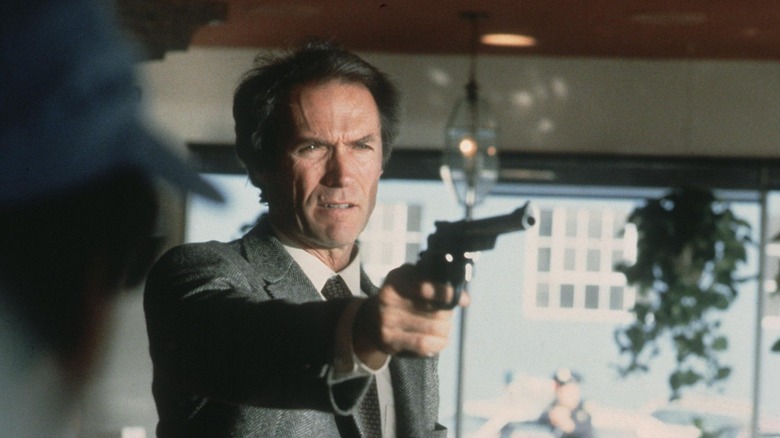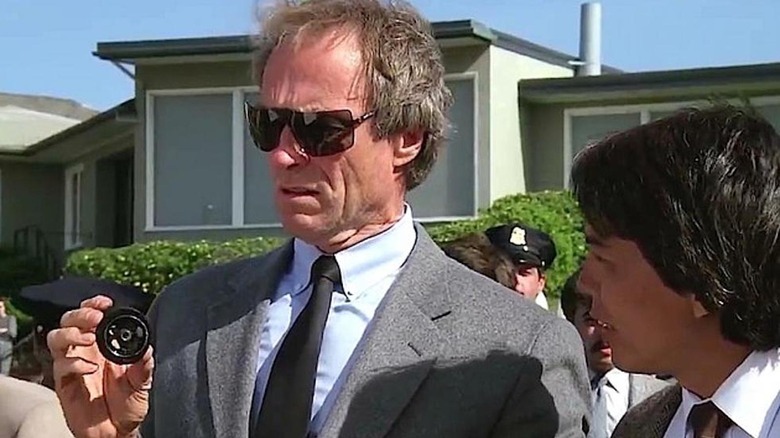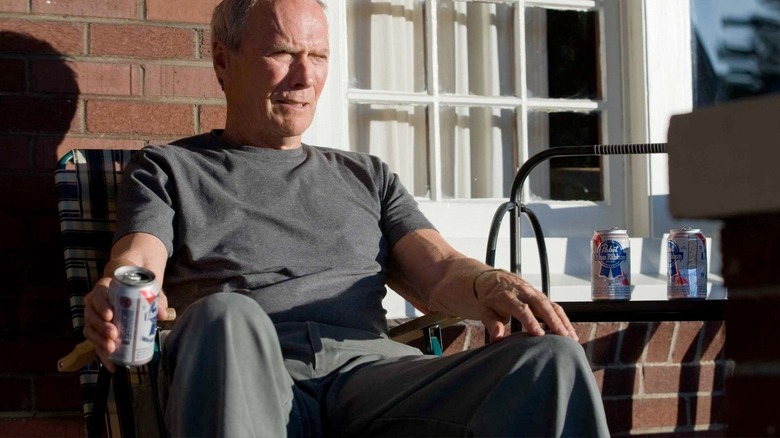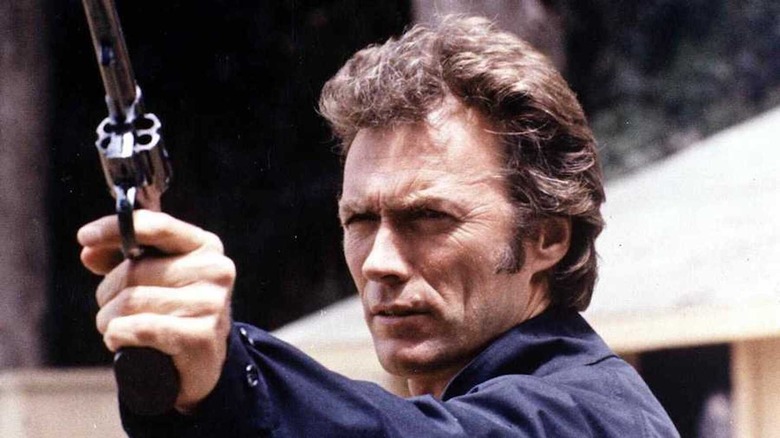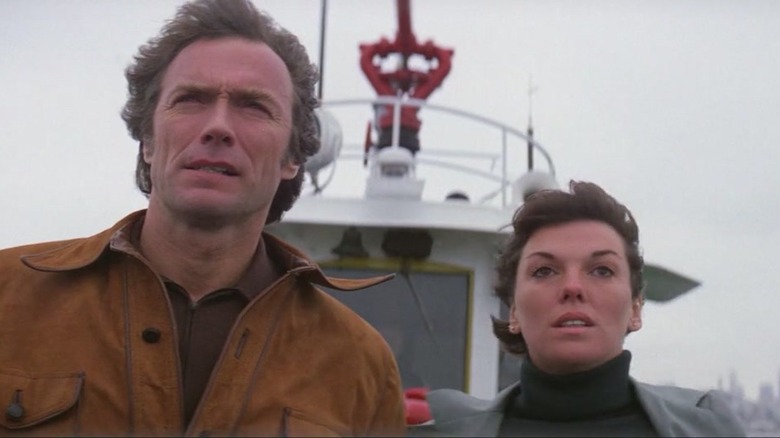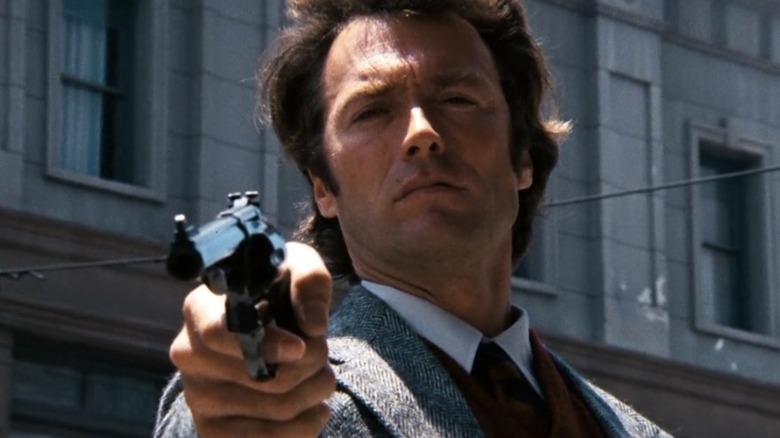Every Dirty Harry Movie Ranked
This post contains spoilers for the "Dirty Harry" films.
Don Siegel's "Dirty Harry" changed cop movies forever upon its release in 1971. Capitalizing on the "law and order" craze stoked by President Richard Nixon, which was a reaction to the perceived anarchy of the various protest movements of the 1960s, Clint Eastwood's Miranda rights-flouting Harry Callahan fed conservative moviegoers a big, juicy slab of red meat. It also allowed the actor to flourish in a genre outside of Westerns, thus expanding his appeal and turning him into one of the most bankable stars in Hollywood.
"Dirty Harry" ends with Callahan, having caught and killed (in self-defense) a vicious serial killer, hurling his badge into a quarry. Throughout the movie, his hard-driving, occasionally extrajudicial methods, which could've resulted in a swift arrest and saved multiple lives, are decried by his superiors. It appears the inspector has had enough. Audiences, however, were far from sated. They were ravenous for more perp-abusing antics from Eastwood, and, being an astute businessman, he was more than happy to pick up the character's trusty 44 Magnum for their amusement.
Between 1971 and 1988, Eastwood made five official Dirty Harry films. I would argue that there is one more unofficial installment, and I might just include it below. The best that can be said about the four straight-up sequels is that Eastwood never phoned it in from a performance or story level. He never took his audience for granted, and did his damndest to justify their re-engagement. Did they always work? There were high highs and awfully low lows. Let's start with the nadir and work our way up to the best of the bullet-riddled bunch.
6. Sudden Impact (1983)
Clint Eastwood has made some morally questionable films throughout his career (most notably the lunkheaded 1990 actioner "The Rookie"), but he's never made a film as cruel or bigoted as "Sudden Impact." The screenplay began life as a star vehicle for Eastwood's then-partner Sondra Locke, but was rewritten as a "Dirty Harry" film by Joseph Stinson, whose only other produced credits are the dreadful Eastwood-Burt Reynolds buddy flick "City Heat" and the limp Burt Reynolds thriller "Stick." All available evidence suggests he was not an elite scenarist.
Indeed, the film's sole spasm of wit — Harry's iconic utterance of "Go ahead, make my day" — was penned by an uncredited John Milius. The rest of the movie has Callahan artlessly inserted into the investigation of a series of related murders that the viewer knows early on are payback for the horrific assault of Locke and her now-catatonic sister. It's rough stuff, but it gets detestably ugly due to the inclusion of a hissably evil butch lesbian character who was the co-ringleader of the assault. The film's biggest cheer moments come when Callahan embarrasses her at a dive bar, and, of course, when she receives her grisly comeuppance at Locke's hands.
"Sudden Impact" is one of the worst films of Eastwood's career, and this includes the Philo Beddoe/Clyde duology. The first third of the movie finds Callahan randomly encountering crimes-in-progress wholly unrelated to the main plot, and ends with a clumsily directed (by Eastwood) finale at a seaside amusement park. Frivolity is fine, if not expected, for a franchise movie, but the material here is too nasty to be any fun.
5. The Dead Pool (1988)
Unburdened by the toxicity of "Sudden Impact," Clint Eastwood's final official Dirty Harry film is a taut, irredeemably silly programmer that, thematically, has more to say about the burden of celebrity than the persistent annoyance of due process. It's got the niftiest hook of the series since "Magnum Force" — Callahan's stature as a crusading cop has landed him in a gambling pool where people bet on the deaths of notable people in the San Francisco area.
"The Dead Pool" is unabashed trash that's smart enough to get in and out in just a shade over 90 minutes. Its highlights include a then-unknown Jim Carrey lip-synching to "Welcome to the Jungle" as a drug-addled heavy metal frontman, a just-getting-known Liam Neeson playing a skeezy horror director, and the great Patricia Clarkson following up her film debut in "The Untouchables" as an aggressive TV reporter who despises Callahan until his gruff charm wins her over. There's also a cheeky parody of the iconic "Bullitt" car chase wherein Callahan is pursued all over the hilly San Francisco streets by a bomb-toting remote control car.
The most satisfying moment of "The Dead Pool" arrives at the finale, when the bad guy gets the drop on Callahan with his 44 Magnum. Will our maverick hero die by his high-caliber sword? No, he'll just find a harpoon cannon and blast his nemesis.
4. Gran Torino (2008)
Clint Eastwood began deconstructing his image in 1992 with the revisionist Western "Unforgiven." The star was only 62 at the time, but he was savvy enough to know that however long he was going to hang around, his ever-advancing age was only going to accentuate his surly persona.
When the production of "Gran Torino" was announced in early 2008, the notion of Eastwood playing a retired, gun-toting bigot drawn into a local gang conflict sounded like a spiritual sendoff for Callahan. To be sure, Eastwood's character, Walt Kowalski, is, in a professional sense, far removed from Harry. He's a former autoworker bitterly playing out the string in a dilapidated house situated in a crime-ridden Detroit neighborhood. He doesn't have much time left (as Eastwood demonstrates via the dependable death's-door visual of the protagonist coughing up blood), but when bullets start whizzing to-and-fro around his doorstep, he befriends a young Vietnamese boy and hauls out the steel at the first sign of trouble.
Walt knows local law enforcement can only clean up after the bloody fact. Prevention is impossible. So, as Callahan would've done, he takes matters into his own hands and tries to instill some sense of order that might spare his unlikely friend a short life of turf squabbling. In every "Dirty Harry" movie, this would've ended with the inspector gunning down the villains. In "Gran Torino," Eastwood goes down unarmed. His murderers will be put away forever, and the young man he's taken a shine to might just find his way out of this drain-swirling hell. In denying us the obligatory big gunfight, Eastwood wistfully closes the book on Callahan. It is a wise, humanistic gesture, and, despite the film's shortcomings (most notably the awkward performances from the non-professional child actors), it sticks with you.
3. Magnum Force (1973)
Directed by Ted Post, an unpredictable journeyman with a sharp speciality in atypical pulp (he helmed the devastating "Beneath the Planet of the Apes," the bizarro thriller "The Baby," and the hugely underrated Vietnam War flick "Go Tell the Spartans), "Magnum Force" is, in theory, the most thematically intriguing film of the "Dirty Harry" franchise. It plays like a response to the criticisms of fascism leveled against the original movie by prominent critics like Pauline Kael and Roger Ebert. You think Callahan's a vigilante? Here's a crew of rogue motorcycle cops who play judge, jury, and executioner with utter impunity and a total lack of compunction.
Written by John Milius and Michael Cimino, it colors within the lines by giving us another sneeringly delivered quip ("A man's got to know his limitations"), and delivers some memorably grisly set pieces (the murder of a prostitute via the ingestion of Draino was considered well out of bounds at the time), but Callahan is portrayed as a relative boy scout. The conflict between a morally principled inspector (in that Callahan's first concern is public safety) and a pack of shoot-first cowboys should be far more complicated. It's a frustratingly missed opportunity, but it's also the best-directed installment outside of the original and works like gangbusters as an action movie. In a perfect world, Siegel or Milius (who was off shooting the terrific "Dillinger" at the time) would've been behind the camera.
2. The Enforcer (1976)
A pro job all the way around, "The Enforcer" is the least adventurous entry in the "Dirty Harry" franchise, but also its most amiable. Granted, the film opens with Callahan acquiescing to liquor store robbers' demands for a getaway car by smashing a police cruiser into the establishment and gunning down the perps, but there's a touch of self-parody at work here. In the real world, this would've been Callahan's last act as a cop, and probably the start of an investigation that would lead to potential jail time. In "The Enforcer," he gets a firm reprimand and a reassignment from homicide.
Callahan's new gig requires him to deal with the San Francisco Police Department's promotion process, and he is aghast to learn that there's an emphasis on hiring more female detectives. He eventually finds himself partnered with a woman, and the production scored a coup-and-a-half when they cast up-and-comer Tyne Daly as Clint Eastwood's foil. The future Tony winner and star of "Cagney and Lacey" is sensational, and her crash-course education is deftly integrated into the midst of a well-constructed plot concerning the errant targeting of a Black Panther-like organization. This is the "Dirty Harry" movie for people who don't like Dirty Harry, and it's a crime that Eastwood and Daly will most likely never share the screen again.
1. Dirty Harry (1971)
This is one of the most brilliantly directed movies of all time. It's not a bravura piece of operatic craftsmanship à la Alfred Hitchcock or Brian De Palma, but rather a masterclass in camera placement, mood, and montage. The opening sequence in which a woman is randomly assassinated in cold blood while swimming in a rooftop pool, thus leading to a precise investigation quarterbacked by Inspector Callahan, is uncommon, New Hollywood genius from a man generally regarded at the time as a B-movie hack.
Like the best films of that era, once you start "Dirty Harry," you watch it through to the end. But while you admire the filmmaking skill, you might find yourself bristling at the film's quasi-endorsement of excessive force. We sympathize with Callahan, whose task is frustratingly complicated by the SFPD's institutional concern for a criminal's rights. What's worse, the psychopath he's chasing, Scorpio (Andrew Robbins), knows Callahan is hemmed in, and exploits this at every possible opportunity.
Is "Dirty Harry" a fascist apologia? I think it's a pulp classic that creates an impossible situation that irritates viewers on both sides of the ideological aisle. Law-and-order absolutists want Robbins' killer brought in by any means necessary, and can't countenance the roadblocks thrown up in Callahan's way; more left-leaning moviegoers know this maniac must be removed from circulation, but doing so Harry's way sets a dangerous precedent.
At a Q&A I attended years ago, Shane Black observed that Callahan is a monster charged with collaring a monster. This is made visually explicit via the scene on the football field, where Harry steps on Scorpio's bullet-shredded leg to coerce a confession. As the killer shrieks, Siegel, a political liberal, cuts to a helicopter shot, which backs away into the distance, removing us from an act we'd prefer didn't exist. We don't want to live in a world with Dirty Harry Callahans, but maybe, sometimes, we need them. I struggle with this every time I watch the film, which is why it's as distressingly vital today as it was 52 years ago.
